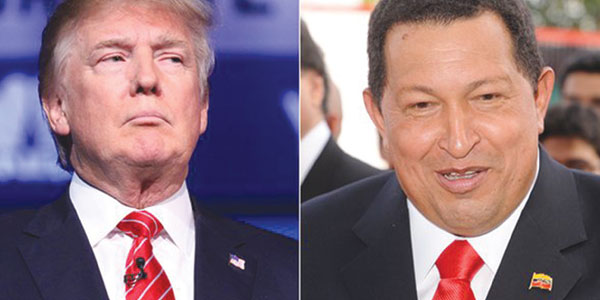
No lo puedo evitar. Cuando veo hablar a Donald Trump inmediatamente me acuerdo de Hugo Chávez. No son igualitos, pero tienen muchas cosas en común.
¿En qué se parece el magnate multimillonario que quiere llegar a la Casa Blanca con el líder bolivariano que atacó la democracia en Venezuela y murió en el 2013? Más de lo que pareciera a simple vista. Basta buscar los nombres de los dos líderes juntos en Google para tener una larga lista de artículos y blogs sobre demagogia, populismo y autoritarismo a principios del siglo XXI.
Les cuento lo que yo he visto de ellos dos. Lo primero que sorprende a quienes han estado frente a Trump o Chávez es que todo es sobre ellos. La palabra “yo” se repite interminablemente en sus discursos, y hablan de sí mismos en tercera persona. Esa es la primera señal de arrogancia y megalomanía.
Concentran el poder; esa es otra característica esencial. No aceptan críticas, son sus proprios mejores consejeros, son siempre el centro de atención, se presentan como todopoderosos, no permiten que nadie compita contra ellos, y sus voluntades van por encima de leyes y tradiciones.
Odian a la prensa. Los altera enormemente que alguien los cuestione. Y si eso ocurre, agreden e insultan. Por ejemplo, cuando confronté a Chávez durante una entrevista en Venezuela en 2000, lo primero que hizo fue insultarme: “Estás repitiendo basura”, me dijo. Trump hizo lo mismo en el 2015 en Iowa; en lugar de contestar mis preguntas me expulsó con un guardaespaldas de una conferencia de prensa.
Pero Trump y Chávez aprendieron a saltarse a la prensa. ¿Para que dar entrevistas a periodistas que hacen preguntas incómodas si pueden conseguir una mayor audiencia en discursos televisivos? Las estaciones de Estados Unidos han transmitido ingenuamente a Trump; para las cadenas nacionales en Venezuela, fue obligatorio.
No recuerdo nunca haber visto a Chávez usar un teleprompter. Improvisaba por horas, y se alimentaba del estado de ánimo de quienes lo oían. Trump casi nunca lo usa— salvo cuando quiere parecer lo que no es — y tiene la misma capacidad chavista de decir lo que la gente quiere oír.
Sí, ambos leen mentes. Ese es su don político. Entienden qué es lo que le duele a la gente, escogen a un enemigo, dividen al país y luego se presentan cómo sus salvadores. Y son enojones. Saben que la indignación es un gran instrumento político, y dirigen la rabia de los electores contra sus enemigos.
Profesan una especie de pensamiento mágico; creen que las cosas van a ocurrir sólo porque ellos lo dijeron y piden una confianza ciega en sus promesas. Tienen una autoestima gigantesca. Sus historias personales — Chávez surgiendo de la pobreza y Trump convirtiéndose en billonario — refuerzan la narrativa electoral: Yo puedo transformar al país a mi imagen y semejanza.
Son el centro de cualquier campaña electoral. Los otros candidatos suelen desaparecer, y toda votación es un referendo sobre su persona. Trump ¿si o no? Chávez ¿sí o no?
Son muy inescrupulosos. Chávez era un gran mentiroso. Mintió flagrantemente para llegar al poder en 1998; dijo que entregaría la presidencia en cinco años o menos, y que no tomaría el control de ninguna empresa privada o medio de comunicación. No cumplió su palabra, cambió las leyes y, sin pudor, se quedó 13 años en el poder hasta su muerte. (Aquí mi entrevista con él: bit/ly/1y5kV4J.)
Trump, también, miente descaradamente. El fin de semana pasado, The New York Times detectó 31 mentiras públicas de Trump y el sitio Politico identificó 87 ocasiones en que el candidato exageró o dijo algo falso dentro de cinco días. (Aquí está el conteo de las muchas mentiras de Trump: cnnmon.ie/2d2aTht.)
Trump y Chávez son los típicos caudillos. De esos, desafortunadamente, hemos tenido muchos en América Latina. Debido a la fragilidad del sistema democrático en Venezuela, Chávez abusó de su poder y se convirtió en un líder casi dictatorial. Eso no puede ocurrir en Estados Unidos y es, quizá, la diferencia más grande entre los dos.
Trump no podría tomar control del ejército, la Corte Suprema, el Congreso y los medios de comunicación como lo hizo Chávez en Venezuela. Pero lo que sorprende tanto es que Trump haya aparecido en una democracia con 240 años de historia.
Por eso, cuando veo a Trump me brinca el corazón porque sigo oyendo a Chávez.
(Jorge Ramos, periodista ganador del Emmy, es el principal director de noticias de Univision Network. Ramos, nacido en México, es autor de nueve libros de grandes ventas, el más reciente de los cuales es “A Country for All: An Immigrant Manifesto”.)
I See Trump, But I Hear Chavez
I can’t help it. Every time I hear Donald Trump speaking, Hugo Chavez comes to mind. They look nothing alike, of course, but they share a startling number of traits.
I’m hardly the first to point out the similarities between the Republican presidential candidate and the late Venezuelan strongman. Just Google “Chavez and Trump” to see a long list of articles and discussions about demagoguery, populism and authoritarianism in the early 21st century. As someone who has been attacked by both Chavez and Trump, let me tell you how they are alike.
Everything is about them. The word “I” is heard nonstop in their speeches. Also, Chavez tended to refer to himself in the third person; Trump has done the same in his speeches. This egocentricity is a sign of arrogance, if not megalomania.
After Chavez was elected president, he consolidated his power, just as Trump would do. Men like Chavez and Trump want neither criticism nor competition. They’re their own best advisers, and they’re always the focus of attention. Their will transcends any law or tradition.
They both hate the press. They get upset if anybody challenges them, and if confronted, they insult and attack. For instance, back in 2000, I was interviewing Chavez in Venezuela. At one point, I wanted to clarify something, and his only response was: “You’re repeating trash.” Trump did something similar at a 2015 news conference in Iowa, although instead of answering my questions, he had a bodyguard throw me out.
Trump, like Chavez, eventually learned how to circumvent the press. Why give news conferences — where journalists can ask embarrassing questions — if you can capture a broader audience with televised speeches? These days, American television networks give Trump an inordinate amount of airtime — while networks in Venezuela had no choice but to broadcast Chavez’s speeches during his tenure.
Also, I never saw Chavez use a teleprompter — he would go on television and improvise for hours. Trump distrusts the teleprompter unless he wants to sound like someone he’s not — though he has the same “Chavista” ability to speak off the cuff and tell people what they want to hear.
Indeed, both Chavez and Trump are mind readers. That’s their political gift. They understand people’s woes, choose an enemy, divide the country, then present themselves as the only saviors. And they practice magical thinking. They believe that things will happen just because they want them to, and they demand blind faith in their promises.
Their self-esteem is huge. They use their personal histories — Chavez’s rise from poverty, Trump’s supposed Midas touch — to shore up their electoral narratives, as if they’re saying, “I can transform the country just as I transformed myself.”
Both men are the center of the election cycle. Other candidates tend to vanish, and the election becomes a referendum on their persona. Trump: Yes or no? Chavez: Yes or no?
They’re both utterly unprincipled. Chavez blatantly lied to gain power in 1998. And he told me that he would likely hand over the presidency in five years and wouldn’t change laws to take control of any private companies or news organizations. But he eventually trashed many laws and stayed in power for 13 years until he died.
Trump is also famously a liar. The New York Times recently detailed 31 of Trump’s most common falsehoods, and Politico identified 87 instances in which the candidate exaggerated or said something untrue within a period of five days. (A tally of Trump’s lies can be seen here: cnnmon.ie/2d2aTht.)
Basically, Trump and Chavez are typical caudillos — strongmen who lean authoritarian. Unfortunately, we’ve seen too many of those in Latin America. Due to Venezuela’s weak democratic system, Chavez abused his power and became what amounted to a dictator. No nation would now envy Venezuela’s fate.
Of course, if elected, Trump wouldn’t be able to take control of the military, the Supreme Court, Congress and the media like Chavez did in Venezuela, so in that way they differ.
However, what’s so disquieting is that a candidate like Trump could rise so fast in a 240-year-old democracy. So yes, when I see Trump, my heart skips a beat because I keep hearing Chavez.










